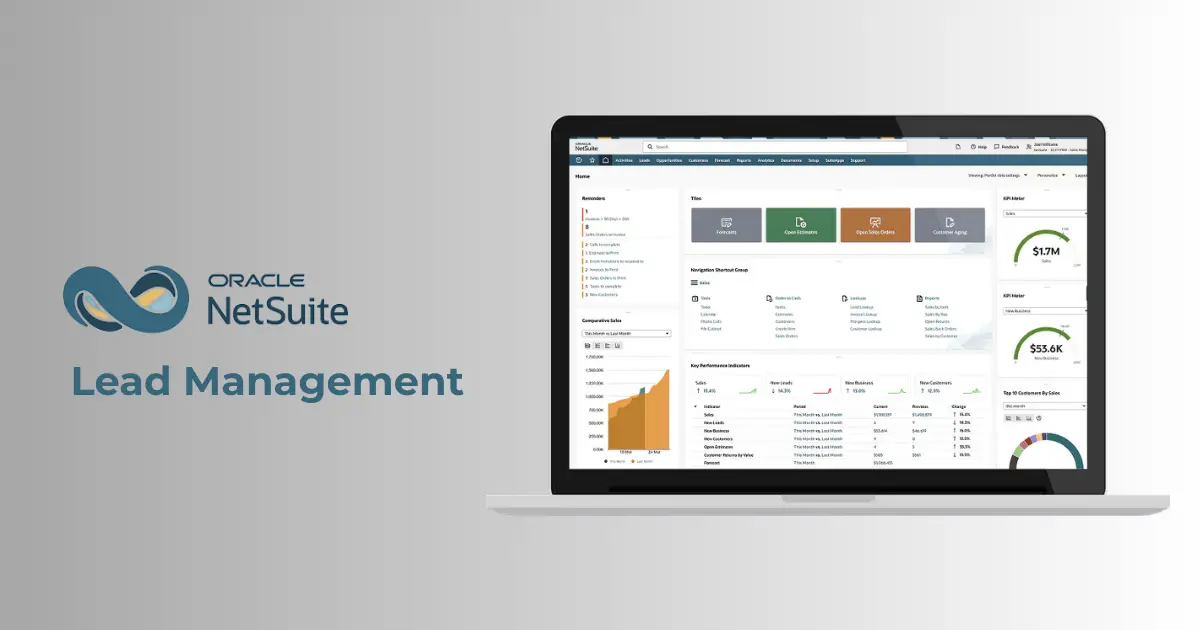NetSuite Lead Management: A Complete Guide to Smarter Sales
Aug 21, 2025

Every business knows the frustration of watching potential deals slip through the cracks. A missed follow-up, a lost email, or an unorganized spreadsheet can cost hundreds—even thousands—in revenue. Managing leads manually simply isn’t sustainable in today’s competitive environment.
With NetSuite Lead Management, a core component of NetSuite CRM, businesses can centralize lead data, automate follow-ups, and ensure every opportunity is acted upon at the right time. From my experience implementing NetSuite for companies across industries, this module not only streamlines processes but also delivers measurable improvements in conversion rates and sales performance.
NetSuite Lead Management is a module within the NetSuite CRM suite, designed to systematically track, prioritize, and convert leads. Unlike basic contact storage tools, it actively organizes the entire lead lifecycle while offering analytics to guide sales and marketing decisions.
Key aspects include:
For businesses looking to scale sales effectively, NetSuite Lead Management moves lead management from a reactive process to a proactive, measurable system.
A system is only as good as its functionality. NetSuite offers features that directly impact how efficiently leads are converted:
Leads can enter the system from multiple channels—website forms, marketing campaigns, trade shows, or direct imports. With SuiteFlow automation, NetSuite can assign leads to the right sales rep based on territory, product line, or predefined rules.
Not all leads are equal. NetSuite allows businesses to score leads based on engagement level, company size, or buying signals. This helps sales teams focus on the opportunities with the highest chance of conversion.
When a qualified lead progresses, NetSuite automatically promotes it into a prospect and links it to an opportunity record. Sales teams can then track quotes, forecasts, and deal progress in one place.
Sales reps, managers, and executives all see data tailored to their role. A rep views their pipeline and daily tasks, while leadership gets consolidated dashboards showing conversion rates, lead sources, and sales velocity.
Because NetSuite integrates with marketing campaigns, businesses can track which campaigns generate the most qualified leads. This enables smarter marketing spend and more accurate ROI tracking.
With saved searches, SuiteAnalytics, and real-time dashboards, businesses can measure KPIs such as:
Every business has its own sales process. NetSuite supports custom workflows, scripts, and approval chains so companies can align lead management with how they operate today—and adapt as they grow.
| Benefit | How NetSuite Delivers |
|---|---|
| Better Collaboration | Marketing, sales, and service teams all work in one system with shared visibility. |
| Improved Conversion Rates | Lead scoring ensures the right prospects get attention at the right time. |
| Reduced Manual Work | Automation handles lead assignment, reminders, and follow-ups. |
| Data-Driven Decisions | Dashboards and analytics highlight what’s working and what needs improvement. |
| Scalable Growth | Customization ensures the system adapts as business needs evolve. |
The key to success lies not just in the software but in aligning processes with business objectives:
Following these steps ensures that every lead is properly nurtured and tracked, translating directly into higher conversion rates and more predictable revenue.
Even with robust software, challenges may arise:
Addressing these challenges early ensures smooth adoption and maximizes the ROI of NetSuite Lead Management.
Managing leads effectively is no longer optional—it is fundamental to sustainable growth. NetSuite Lead Management, transforms lead tracking into a proactive, strategic process, giving teams the tools to act efficiently and executives the insight to make informed decisions.
Implementing NetSuite Lead Management isn’t just about turning on features—it’s about aligning the system with how your sales team actually works. At ERP Peers, we help companies configure NetSuite CRM so that lead capture, nurturing, and conversion flow naturally into your sales cycle. Our focus is on building a setup that reduces manual work, keeps data clean, and gives decision-makers real visibility into the pipeline.
If you’re considering optimizing your lead management process with NetSuite, let’s have a conversation. We’ll walk you through what’s possible, highlight quick wins, and design an approach that fits your growth goals.